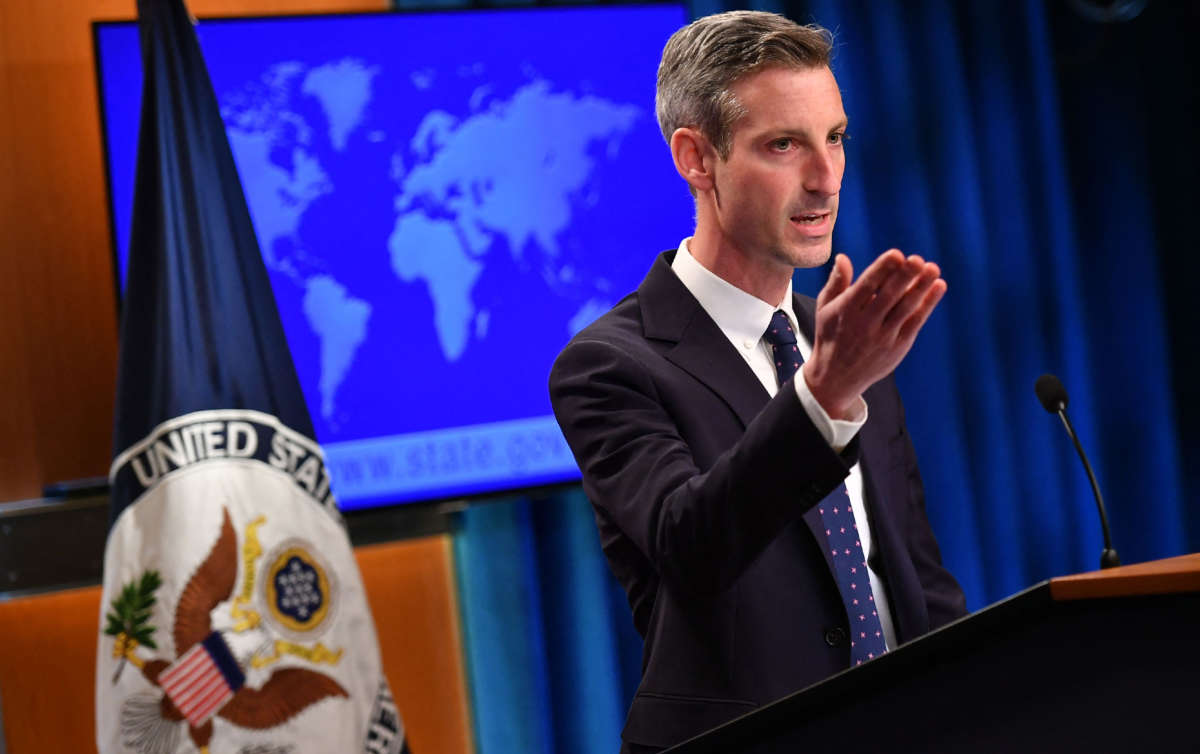Veteran Associated Press reporter Matt Lee grilled a State Department spokesperson Thursday over the U.S. government’s refusal to provide direct evidence for its claim that Russia is planning to fabricate a mass casualty event as a pretext to invade Ukraine, an allegation that the Pentagon said is backed up by intelligence.
During a press briefing, Lee asked the State Department’s Ned Price — a former CIA official — to furnish concrete proof of the government’s accusation, which suggests Russia is plotting an elaborate false flag attack involving a graphic “propaganda video… depicting corpses, crisis actors pretending to be mourners, and images of destroyed locations or military equipment.”
Lee said he has every reason to be skeptical of U.S. government assertions, given the lies that the Bush administration used to justify the invasion and occupation of Iraq.
“I remember WMDs in Iraq,” said Lee.
Watch the exchange:
WATCH: Heated exchange between @APDiploWriter Matt Lee and @StateDeptSpox Ned Price on declassified information. pic.twitter.com/8TFJdSW4M6
— CSPAN (@cspan) February 3, 2022
After Price outlined the U.S. government’s allegations, Lee noted that the Biden administration has “shown no evidence to confirm” the alleged plot. As the New York Times reported earlier Thursday, “Officials would not release any direct evidence of the Russian plan or specify how they learned of it, saying to do so would compromise their sources and methods.”
But Price insisted during Thursday’s briefing that the Biden administration’s decision to go public with the false flag accusation constitutes, in and of itself, evidence that Russia is planning such an operation.
“This is derived from information known to the U.S. government, intelligence information that we have declassified,” Price said.
“Okay, well, where is it?” Lee asked in response. “Where is this information?”
“I just delivered it,” the State Department spokesperson said.
When Lee continued to press the matter, noting that “a series of allegations and statements” is not evidence, Price accused the longtime journalist of wanting “to find solace in information that the Russians are putting out.”
The exchange circulated rapidly and widely on social media, with observers applauding Lee for his persistent and straightforward questioning and arguing that Price’s responses were indicative of the U.S. government’s intolerance of skeptical inquiry.
“This is wild,” NSA whistleblower Edward Snowden, president of the Freedom of the Press Foundation, tweeted in response to the back-and-forth. “The State Department’s spokesman can’t comprehend why the Associated Press feels the need to distinguish between a claim and a fact, and becomes visibly offended — and then angered — by the suggestion that his claims may require evidence to be accepted as credible.”
Join us in defending the truth before it’s too late
The future of independent journalism is uncertain, and the consequences of losing it are too grave to ignore. To ensure Truthout remains safe, strong, and free, we need to raise $24,000 by the end of today. Every dollar raised goes directly toward the costs of producing news you can trust.
Please give what you can — because by supporting us with a tax-deductible donation, you’re not just preserving a source of news, you’re helping to safeguard what’s left of our democracy.
